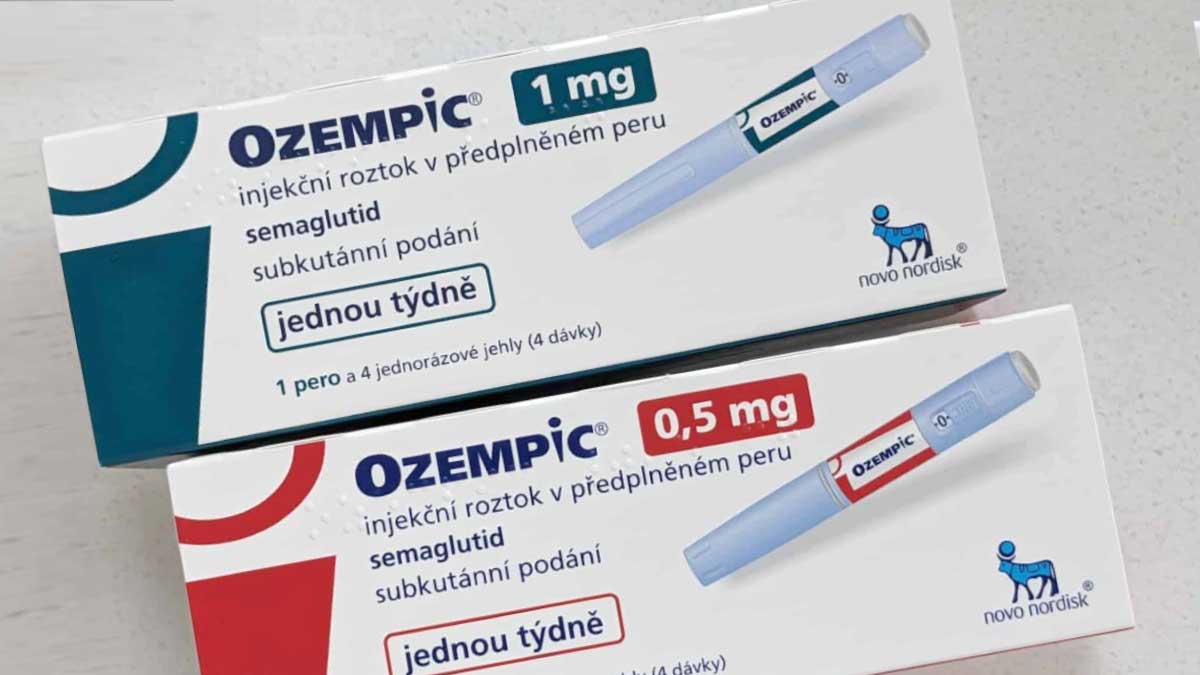- Home
- Billionaires
- Investing Newsletters
- 193CC 1000
- Article Layout 2
- Article Layout 3
- Article Layout 4
- Article Layout 5
- Article Layout 6
- Article Layout 7
- Article Layout 8
- Article Layout 9
- Article Layout 10
- Article Layout 11
- Article Layout 12
- Article Layout 13
- Article Layout 14
- Article Sidebar
- Post Format
- pages
- Archive Layouts
- Post Gallery
- Post Video Background
- Post Review
- Sponsored Post
- Leadership
- Business
- Money
- Small Business
- Innovation
- Shop
Recent Posts
Ozempic: Can It Help Combat Opioid Overdoses?

Recent research has suggested that Ozempic, a medication primarily prescribed for managing Type 2 diabetes, may also play a significant role in reducing the risk of opioid overdose. This revelation comes from a comprehensive study that involved nearly 33,000 participants, showcasing a potential connection between the diabetes drug and a crucial public health issue. The study, published in the JAMA Network Open, monitored approximately 3,000 patients diagnosed with both Type 2 diabetes and opioid use disorder. These participants were prescribed semaglutide, the active ingredient found in Ozempic, Rybelsus, and Wegovy, between December 2017 and December 2023. In contrast, another group of 29,972 patients received different diabetes medications during the same timeframe.
The findings from the study were both compelling and alarming, highlighting the urgent need for effective alternatives in combating the opioid crisis. Researchers observed a remarkable 60% reduction in opioid overdose incidents among those taking semaglutide compared to those on other diabetes treatments. Specifically, there were only 48 reported cases of overdose in the semaglutide group, while the control group experienced 72 cases. This significant difference raises important questions about the potential for semaglutide to serve as a viable alternative treatment for individuals grappling with opioid addiction. The results underscore the necessity for innovative approaches, especially considering the limitations of existing therapies for opioid use disorder.
Despite the availability of several FDA-approved medications for treating opioid use disorder, only about 25% of patients are prescribed these treatments. Alarmingly, around half of those prescribed such medications discontinue them within six months of starting therapy. This concerning trend highlights the critical need for effective and alternative therapies to address the escalating opioid crisis in the United States. Given the rising number of opioid-related overdose deaths—over 81,000 fatalities were reported in 2023 alone—it’s clear that traditional methods are not sufficiently addressing the problem. The study’s findings present an opportunity for the medical community to explore new treatment avenues that could provide better outcomes for those struggling with opioid addiction.
But why might semaglutide have this effect on addiction? The researchers acknowledge that the precise mechanism linking semaglutide to opioid use disorder remains unclear and call for further investigations to unravel this relationship. Interestingly, previous studies have indicated that semaglutide may also benefit individuals dealing with alcohol use disorder. Patients taking semaglutide reported fewer cravings for alcohol, suggesting the drug’s potential utility in treating various substance use disorders. This discovery is particularly noteworthy, as it highlights the possibility that a medication primarily aimed at managing diabetes could have broader implications in the field of addiction medicine.
Semaglutide belongs to a class of medications known as glucagon-like peptide-1 (GLP-1) receptor agonists. These drugs are specifically designed to treat diabetes and promote weight loss by interacting with the brain’s appetite-regulating centers. They achieve this by suppressing appetite, lowering blood sugar levels, and improving overall glycemic control. Moreover, GLP-1 mimics the action of the GLP-1 hormone, which plays a crucial role in the brain’s reward pathways that motivate behaviors associated with food and pleasure. This mechanism may extend to substances like alcohol and opioids, potentially explaining semaglutide’s effects on addiction. Researchers theorize that because the brain circuits involved in eating behaviors overlap extensively with those that drive substance use, semaglutide’s appetite-suppressing properties could translate into a reduced risk of opioid overdose.
The public health implications of these findings are profound and warrant immediate attention. According to data from the Centers for Disease Control and Prevention (CDC), there were a staggering 107,543 drug overdose deaths in the U.S. in 2023. Opioid-related overdoses accounted for over 81,000 of these fatalities, underscoring the urgent need for effective strategies to combat the opioid epidemic. As healthcare providers and policymakers seek to implement effective interventions, the possibility of leveraging semaglutide as a part of addiction treatment could be a game changer in reducing overdose rates and saving lives.
In addition to its potential impact on opioid use disorder, GLP-1 receptor agonists like semaglutide have shown promise in addressing a range of other medical conditions. Following successful clinical trials that demonstrated cardiovascular benefits, Novo Nordisk gained FDA approval in March to update Wegovy’s label to include these advantages. Similarly, Eli Lilly, the manufacturer of Zepbound and Mounjaro, has announced plans to seek FDA approval to expand Zepbound’s indications to address sleep apnea, based on earlier studies that demonstrated its efficacy in improving symptoms of the disorder.
Furthermore, emerging research suggests that GLP-1 receptor agonists could offer therapeutic benefits for a variety of neurological and psychological conditions, including Alzheimer’s disease, Parkinson’s disease, depression, anxiety, and bipolar disorder. Additionally, preliminary studies indicate that these medications may hold potential in treating kidney disease, certain cancers, high blood pressure, and fatty liver disease. The versatility of GLP-1 receptor agonists illustrates their potential to transform not just diabetes management, but also the landscape of treatment for numerous chronic conditions.
While the initial findings linking semaglutide to a reduced risk of opioid overdose are encouraging, they also emphasize the necessity for further research to better understand the underlying mechanisms. As the healthcare community grapples with the dual challenges of managing chronic conditions like diabetes and addressing the opioid crisis, the exploration of drugs like semaglutide for multifaceted treatment options could prove invaluable.
In summary, the study suggesting that Ozempic may decrease the risk of opioid overdose in patients with Type 2 diabetes highlights the importance of innovative approaches in tackling the complex interplay between metabolic disorders and substance use disorders. As researchers delve deeper into the mechanisms at play, semaglutide may emerge as a promising option for individuals facing the dual challenges of managing diabetes and overcoming addiction. The potential of semaglutide to address such intertwined health challenges offers hope in a landscape desperately in need of effective solutions.
Recent Posts
Categories
- 193 Countries Consortium Partner1
- 193cc Digital Assets2
- 5G1
- Aerospace & Defense48
- AI37
- Arts3
- Banking & Insurance11
- Big Data3
- Billionaires1,467
- Boats & Planes1
- Business332
- Careers13
- Cars & Bikes79
- CEO Network1
- CFO Network17
- CHRO Network1
- CIO Network1
- Cloud10
- CMO Network18
- Commercial Real Estate7
- Consultant1
- Consumer Tech194
- CxO1
- Cybersecurity73
- Dining1
- Diversity, Equity & Inclusion4
- Education7
- Energy8
- Enterprise Tech29
- Events11
- Fintech1
- Food & Drink2
- Franchises1
- Freelance1
- Future Of Work2
- Games149
- GIG1
- Healthcare79
- Hollywood & Entertainment203
- Houses1
- India’s 1000 Richest1
- Innovation46
- Investing2
- Investing Newsletters4
- Leadership65
- Lifestyle11
- Manufacturing1
- Markets20
- Media327
- Mobile phone1
- Money13
- Personal Finance2
- Policy569
- Real Estate1
- Research6
- Retail1
- Retirement1
- Small Business1
- SportsMoney42
- Style & Beauty1
- Success Income1
- Taxes2
- Travel10
- Uncategorized14
- Vices1
- Watches & Jewelry2
- world's billionaires1,436
- Worlds Richest Self-Made Women2
Related Articles
Musk Endorses Mounjaro, Backs Affordable Weight-Loss Drugs
Elon Musk, the CEO of Tesla, made headlines on Christmas Day with...
By 193cc Agency CouncilDecember 27, 2024What Healthcare Can Learn from Nvidia’s Success
The tech industry is undergoing a seismic transformation, with two of its...
By 193cc Agency CouncilDecember 16, 2024Salmonella Triggers Recalls of Costco Eggs and Cucumbers
The recent salmonella outbreak has prompted the recall of two major food...
By 193cc Agency CouncilNovember 30, 2024Bird Flu Found in Raw Milk in California, Recall Issued
California health authorities have confirmed the presence of the bird flu virus...
By 193cc Agency CouncilNovember 25, 2024















Leave a comment